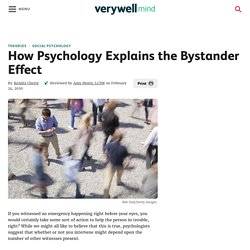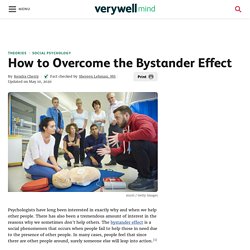

Would you:
1) Call the ambulance immediately
2) Rush to the help the injured pedestrian and driver
3) Stand on the spot and wait for someone to take action first
In many scenarios, majority of the people would stand and wait for someone to take action first; be it calling the ambulance or rushing to the aid of the injured.
This is the Bystander Effect where an individual is less likely to offer a helping hand when there are other people at the scene.
What Is the Bystander Effect?
If you witnessed an emergency happening right before your eyes, you would certainly take some sort of action to help the person in trouble, right?

While we might all like to believe that this is true, psychologists suggest that whether or not you intervene might depend upon the number of other witnesses present. Bystander Effect: What Is It and What You Can Do About It. What the bystander effect looks like A little after 3 a.m. on March 13, 1964, Catherine “Kitty” Genovese parked her car and walked to her apartment in Queens, New York, after finishing her shift as a bar manager. Serial killer Winston Moseley was out to victimize someone that night. Genovese became his target. When he followed her, she ran. As Moseley reached her and began stabbing her with a hunting knife, Genovese screamed, “Oh, my God, he stabbed me!
When lights in surrounding apartments flipped on and one man called out his window, the attacker ran and hid in the shadows. There was widespread public condemnation of the witnesses who did not come to Kitty Genovese’s aid. The related terms “bystander effect” and “diffusion of responsibility” were coined by social psychologists as a result of this research. The bystander effect describes situations in which a group of bystanders witness harm being done, yet do nothing to help or stop the harmful activity.
According to the U.S. Meaning of Bystander Effect. How to Overcome the Bystander Effect. Psychologists have long been interested in exactly why and when we help other people.

There has also been a tremendous amount of interest in the reasons why we sometimes don't help others. The bystander effect is a social phenomenon that occurs when people fail to help those in need due to the presence of other people. In many cases, people feel that since there are other people around, surely someone else will leap into action.1 While the bystander effect can have a negative impact on prosocial behavior, altruism and heroism, researchers have identified a number of different factors that can help people overcome this tendency and increase the likelihood that they will engage in helping behaviors.2 Some of these include: Witnessing Helping Behavior Sometimes just seeing other people doing something kind or helpful makes us more willing to help others.
Imagine that you are walking into a large department store. Being Observant Being Skilled and Knowledgeable Guilt Feeling Good. Ways to overcome the Bystander Effect. The bystander effect: Why didn't anyone help? 10 Notorious Cases of the Bystander Effect. The bystander effect is the somewhat controversial name given to a social psychological phenomenon in cases where individuals do not offer help in an emergency situation when other people are present. The probability of help has in the past been thought to be inversely proportional to the number of bystanders. In other words, the greater the number of bystanders, the less likely it is that any one of them will help. This list describes the prototype of the effect and cites nine particularly heinous examples. The Parable of The Good Samaritan First, the prototype of the bystander effect.
Jesus then explains, with the following parable, that everyone is everyone’s neighbor, and that help should be offered to anyone in need of it, regardless of who or what that person is. A Jew is going along the road, and is beset by bandits, who beat him severely, strip his clothes, and rob him.